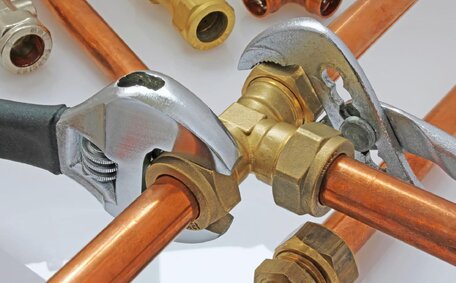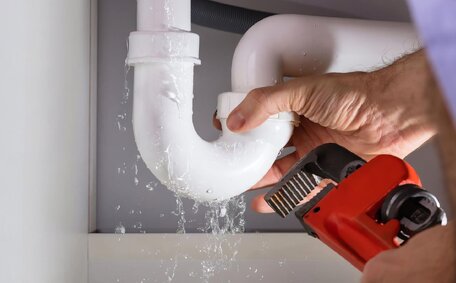Introduction to Off-Grid Hot Water
Living off the grid introduces unique challenges, such as access to reliable hot water. At St Ives Plumbing, we have years of expertise in devising plumbing solutions for off-grid homes, comprehending the intricacies of independent water heating.
This article explores hot water solutions for off-grid living, covering different technologies such as solar hot water heaters, heat pumps, and wood-fired boilers, alongside various energy sources like solar power and propane.
We’ll examine the advantages and drawbacks of each option, considering key aspects such as initial investment, energy savings, maintenance, and environmental effect.
Whether you need a compact, energy-efficient water heating system for installation in your house, or a more substantial solution for a vast off-grid homestead, we will cover the prime options to match your requirements and budget.
Our practical guidance aims to optimise the energy captured by your home, facilitating a more sustainable and comfortable off-grid life. For personalised advice on your hot water setup, feel free to get in touch.
Evaluating Your Energy Source Options
When living off the grid, choosing the right energy source for your hot water system is crucial. The climate, home size, and hot water usage all impact which option makes the most sense.
Solar Power
Solar water heater technology harnesses the sun’s renewable energy to heat water. Systems can harness solar energy, effectively converting it into hot water energy using rooftop collectors linked to an insulated storage tank. Pros:
- Lower running costs compared with traditional gas electric systems
- Eco-friendly
- Efficient in sunny areas like St Ives
Cons:
- Higher upfront cost
- Needs direct sunlight during the day; ineffective without direct sunlight
- May require supplemental back-up heating during the winter months
Heat Pumps
Heat pumps employ electricity to extract ambient warmth, transferring it to your water effectively. Benefits include:
- More efficient than electric-only systems
- Versatile installation
Cons:
- Reliant on electrical power
- Lower efficiency in very cold weather
Solar Water Heating Systems
Harnessing solar panels, water solar heating serves as an outstanding eco-friendly choice for off-grid habitats. These systems use rooftop solar thermal collectors, which take up less space than solar PV panels, to harness heat from the sun. This solar energy heats either water directly or a heat-transfer fluid that in turn ensures your water heated adequately.
Active vs Passive Solar Water Heating
Solar water heaters generally fall into two main categories:
- Active systems use electric pumps to circulate water or fluid through the rooftop solar collectors.
- Passive systems rely on natural convection and gravity to move water through the collector, without any mechanical assistance.
Active pump solar solutions improve efficiency but require some external power system input. Passive systems contain fewer electronic components so have a simpler, more robust design.
Efficiency and Storage
Contemporary systems can supply 60-80% of a household’s yearly hot water needs. Evacuated tube systems and thermal water storage tanks ensure minimal heat loss and a bountiful supply, even during overcast periods. For extended periods of overcast conditions or heightened water use, most systems incorporate a robust heating element as reliable backup to provide hot water.
Installation, Costs and More
When installing off grid solar options, you’ll find our range of solar hot water heater options are decidedly user-friendly. They can work as stand alone units or integrate with an existing water heater setup. We recommend consulting a licensed professional to ensure optimal use of your space with proper sizing, placement, and connections.
Upfront system costs, although higher than conventional heaters, are balanced by the dramatic efficiency improvements in solar technology that people use, resulting in faster payback periods. Harnessing the sun’s hot water energy with fewer moving parts and cost-free solar input, solar water heating is a prudent choice that can save a lot on the continual expenses of propane or electric.
Heat Pumps
Unlike solar water heating, heat pumps work by extracting latent heat from ambient air and transferring it to water. This design principle makes heat pumps a functional choice even in contexts where solar without direct sunlight would be a limitation.
For instance, quality heat pumps like the Sanden Eco Plus, use roughly 500W per hour to heat up to 270 litres of water. Advanced heat pump technology ensures plentiful hot water with minimal energy use, particularly during sunny conditions.
Homes with pre-installed solar systems can integrate heat pumps seamlessly for a daily supply of hot water. Heat pumps are highly energy-efficient, using less than 25% of the energy of traditional electric hot water tanks. In regions like St Ives, summer’s surplus solar output can power heat pumps with ease, helping to conserve battery life.
With experience installing heat pump systems for off-grid clients, our team at St Ives Plumbing are equipped to determine if this efficient electric heating choice complements your solar system.
LPG/Propane Systems
Available as either instantaneous heaters or storage tank systems, they heat water on demand while conserving space.
For smaller abodes or portable homes, LPG instant hot water systems offer considerable convenience and can be more practical than larger, more cumbersome systems. Storage tank devices can facilitate larger volumes to be heated at once. And integrated units combine water heating systems with space heating capabilities.
While LPG water heaters can utilise the sun’s gifts, reliance on propane suggests a heater can have a lesser eco-friendly performance. Some may prefer wood heating for that reason. Remote locations can also present fuel access issues.
However, locating adequate propane supply lines or deliveries would still prove less challenging than fuels like natural gas around St Ives. So as long as ecologically-neutral operation isn’t a prime motivator, LPG presents an efficient and logical off-grid hot water choice for your area.
Wood-Fired and Wetback Systems
Wood-fired water heating systems, also known as wetbacks, offer an eco-friendly, renewable option well-suited for living offgrid. Burning wood is a proven, traditional method to produce heat, warming water using a boiler that feeds a water tank or transferring heat via an exchanger coil.
Unlike solar or heat pumps, wood-fired systems provide reliable hot water regardless of weather or sunlight. And relying on a renewable fuel source harvested from sustainably managed forests makes them carbon-neutral.
Considerations
Wetback systems require a readily available local firewood supply, rendering them practical in areas with abundant resources. They also need proper installation and fire maintenance for smooth operation.
Wood-burning wetbacks take longer to heat water than instant gas or electric heaters, potentially affecting convenience. Planning ahead helps ensure adequate hot water despite this minor inconvenience. With the right conditions, wood-fired wetbacks present a time-tested, ecological, and cost-effective off-grid hot water solution.
Installation and Maintenance Considerations
Correct installation is vital for the safety, efficiency, and reduced fossil fuel reliance of any off-grid hot water system. Our qualified team at St Ives Plumbing has extensive experience customising systems to individual preferences and environments.
We handle all aspects of installation including:
- Calibrating solar collectors, water tanks, and system your hot water assets for peak performance
- Structural mounts, plumbing connections and electrical wiring
- Integrating new heat sources with existing setups
- Advising on optimal placement for sunlight exposure and space limitations
DIY solar installation may be appealing, but it often involves complexities best managed by professionals. We also offer ongoing maintenance to protect your investment with services like:
- Solar collector cleaning for maximum efficiency
- Checking refrigerant, anode rods and pump operation
- Tuning wood-fired systems for clean, efficient burns
- Testing valves, insulation, controllers and safety features
Preventative maintenance is crucial to address issues early and avoid them developing into significant problems. And Regular maintenance can extend the reliable performance of an off-grid solar water system to more than 15 years.
To get your new installation or maintenance for your current off-grid hot water tank in St Ives, reach out to our specialists. We tailor sustainable, efficient solutions backed by our expertise and quality workmanship.
Comparing Costs of Different Systems
When deciding which off-grid hot water system best suits your needs, a key factor is cost. Here is an overview of typical price points for purchase and installation, plus operating costs over time:
Upfront System Costs
- Solar water heating – $5,000 to $10,000 installed
- Heat pumps – $3,000 to $7,000
- LPG/propane systems – $2,000 to $5,000
- Wood-fired systems – $8,000 to $15,000 with storage tank
Government incentives may lower initial expenses for solar thermal systems and heat pumps. LPG and wood-fired options require less initial capital if you DIY install.
Operating Costs Over Time
Once in action, solar water heating becomes the cheapest way to avoid more expensive propane or firewood for heating needs. And with no solar exposure issues in St Ives, the only operating costs are occasional maintenance.
Additionally, heat pumps when using solar photovoltaics, tap into 'free electricity’ which might be otherwise surplus to requirements. Their operational costs are markedly lower, mostly requiring only basic electricity network maintenance.
In contrast, buying ongoing fuel for LPG or sourcing firewood where available adds continual costs for other systems. So while cheaper installed, lifetime expenses typically exceed solar or heat pump options.
By consulting our qualified staff on costs and considerations for your situation, we help find your most cost-effective sustainable hot water solution.
Compliance and Safety Standards
When installing any off-grid hot water system, it is crucial to comply with relevant safety standards and regulations. This ensures the system operates reliably while avoiding potentially dangerous issues.
Australian/NZ Standards
In Australia and New Zealand, Every aspect of plumbing must comply with PCA Compliance Codes and AS/NZS 3500 standards. Key areas covered for water heaters include:
- Material and heat source standards
- Storage tank capacity rules and insulation requirements
- Allowable mounting locations and clearances
- Mandatory pressure release valves and drain provisions
- Correct gas, electrical, and solar component connections
- Designated access and ventilation for maintenance
Hiring professionals like St Ives Plumbing guarantees your hot water system is optimised and adheres to Australian safety standards, depending on your needs.
Professional Installation
DIY installations carry the risk of non-compliant setups and potential hazards, such as:
- Faulty plumbing allowing contamination
- Inadequate tank pressure relief causing explosions
- Gas or exhaust leaks causing poisoning
- Overheating and fires from poor ventilation
Our accredited plumbers follow best practices and current standards when installing and maintaining water heaters in off-grid homes.
Trust our expertise to properly assess your situation and ensure the right solution not just efficiently heats water but does so safely, legally and sustainably.






